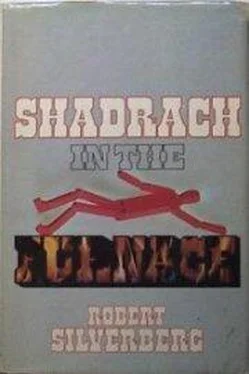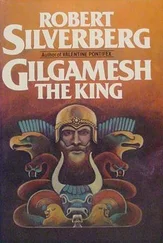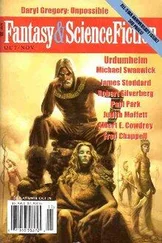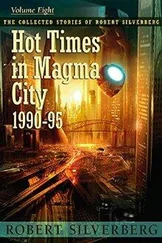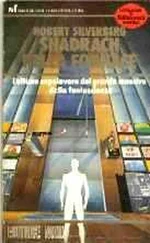“The Antidote stockpiles are stable at best, or even decreasing slightly,” Horthy continues, framing his words with the exaggerated precision of the extremely intoxicated. “What Mangu tells us is a lie intended to pacify the populace. He thinks that telling them such things will make them happy and induce them to love him. Pfaugh!” The woman tries desperately to quiet him. She is short and compact, efficiently constructed with her center of gravity close to the ground; her face is partly obscured by an ornate, flamboyant green domino, but Shadrach, after a moment, recognizes her as Donna Labile, no less a mogul than Horthy himself, in fact minister of demography for the Committee, whose responsibility it is to maintain a reasonable balance between births and deaths. Masked or not, it is she, no mistaking that ferocious jaw, and Shadrach observes that Horthy too has a mask, dangling from his left hand. Perhaps he thinks he still wears it. She struggles with him, taking the mask from his limp hand and attempting to fasten it in place, but be brushes her aside, and, lurching toward Shadrach Mordecai, greets the doctor with so grandiose a bow that he nearly pitches himself from the platform. Donna Labile, flapping his discarded mask about, flutters around him like an angry insect. “Ah, Dr. Mordecai!” Horthy bellows. “Our leader’s devoted Aesculapius! I greet you!”
“… the climax of our unending struggle against…” Mangu says from the glowing globular screen.
Horthy jerks a thumb at the image of the heir-apparent. “Do you believe that trash, Mordecai?”
Shadrach has his own suspicions about the sincerity of the Khan’s oft-expressed plan for universal distribution of the Ron-cevic Antidote, but they are suspicions rather less than half formed, and in any case this is no place to voice them. Softly he says, “I’m not a member of the Committee, Dr. Horthy. The only inside information I have concerns such things as the endocrine balance of Genghis Mao.”
“But you have an opinion, haven’t you?”
“My opinion’s an uninformed one, and therefore worthless.”
“Such a diplomat you are!” Horthy says in contempt.
“Pay no attention,” Donna Labile begs. “He’s had too much tonight. Eating kot and yipka like so much candy, drugging himself crazy, now risking his whole career—”
“It seems to be the night for it,” Shadrach remarks.
“A filthy hoax,” Horthy says heavily, shaking his fist at the screen. He is trembling, ashen-faced beneath his florid glow, sweating profusely. “Cruel, sinister, bestial—” and he lapses into a series of unintelligible sibilant expletives, presumably Magyar, toward the end of which he begins to sob. Donna Labile, meanwhile, has disappeared. After a moment she returns leading two tall men who wear the gray-and-blue uniform of the Citizens’ Peace Brigade. It is odd to find a couple of Citpols here, for Shadrach thinks of Karakorum as an open city, naturally monitored by secret spy-eyes and the usual audio bugs but otherwise unpoliced; and these two are more man ordinarily repellent even for Citpols, for they look like identical ugly twins, gray-faced and gray-eyed, with flat heads and stiff close-cropped hair and strange malproportioned bodies, all legs and no middle. They walk in a weird clucking stride, like a couple of poorly programmed robots, but they appear to be human, more or less: perhaps the Committee, finding volunteers scarce, is raising a clone of monsters to serve as policemen. They surround Horthy and speak to him in low, urgent tones. One of them takes the domino from Donna Labile and with curiously fussy, almost mincing, gestures, affixes it over the bridge of Morthy’s nose.
Then, slipping their arms gently under those of the minister of technology, they lead him, lifting him a bit so that his feet are dragging, toward a gray enameled door at the far end of the platform. Shadrach Mordecai is uncertain whether they are arresting him at Donna Labile’s instigation or — more likely — are hauling him up to some behind-the-scenes sobering-up facility before he can compromise himself further.
“… a glorious epoch in the splendid history of the human race …” Mangu booms.
The tube-train arrives. The survivors of the night’s revelries at Karakorum move slowly, sleepily aboard.
Before he heads for his hammock, Shadrach Mordecai visits the Khan. Though the implants tell him all is well, he feels obligated after his outing to make a personal call on his patient. It is early morning, and Genghis Mao lies in blissful sleep: through the electroencephalographic node in Mordecai’s haunch travel the slow rhythmic quivers of the Chairman’s peaceful delta waves. All the telemetered data reaching Shadrach is encouraging: blood pressure good, lungs clear of fluid, temperature back to normal, cardiac activity fine, bile production excellent. The newly installed liver has obviously established itself already and has begun to undo the deteriorations of the recent weeks. Shadrach passes through the interface and enters the bedroom where the Chairman rests within the intricate cocoon of the intensive-care support system. The biometer readings on the support system’s instrument panel instantly confirm Shadrach’s long-distance diagnosis: the Chairman is doing amazingly well. None of the emergency equipment has been needed, neither the oxygen tent nor the electrodialysis machine nor the heart-lung respirator nor the twelve or fourteen other instruments. There he lies, relaxed, a faint smile on his thin lips, this man of ninety years or so, only sixteen hours out of major surgery and already nearly strong enough to resume the stress of normal life. But of course there is nothing normal about Genghis Mao’s body, reconstructed so many times out of so many healthy borrowed parts: like the cannibal chieftain, he has feasted on the flesh of heroes, and their strength has become his strength. And, Shadrach suspects, there is some quality of the mind within that tapering triangular skull that will not admit bodily weakness, that banishes it altogether from his metabolic cycle. The doctor stands for a few moments by the bedside, admiring Genghis Mao’s toughness of constitution, half expecting Genghis Mao to wink at him, but the Khan’s sleep holds him utterly.
Off to his own, then. With Genghis Mao in such fine shape, Shadrach feels free to sleep until sleep is done with him, even if that is midafternoon. Crowfoot already lies curled and dozing in his hammock; he strips, snuggles in beside her, delicately coils his belly and thighs against her back and buttocks, and lets consciousness go from him.
He is awakened some hours later by an internal jolt that nearly throws him from the hammock. A geyser of adrenalin floods his bloodstream; his heart begins to pound, his limbs tremble, all systems switching on in a violent alarm reaction. Automatically he begins a process of self-diagnosis, considering and rejecting within the first fraction of a second such possibilities as a coronary thrombosis, a cerebral hemorrhage, pulmonary edema; a moment later, as the thunderous tachycardia begins to subside and his breathing starts to return to normal, he realizes that it is nothing more serious than an episode of shock leading into a classic fight-or-flight syndrome; and an instant after that he becomes aware that it is all purely vicarious, that there is nothing wrong with him at all but that he is getting an intense overload via the telemetering system that links him to Genghis Mao.
He leaps from the hammock, sending it swinging Wildly. “Shadrach?” Nikki asks, her voice groggy and dim. “Shadrach, what’s happening?”
Catching the hammock for a moment to stabilize it, he mutters an apology. “Trouble with the Khan,” he says, groping along the floor for his casually discarded clothing. He is fully awake now, but his body is so saturated with the hormonal outpourings engendered by surprise and alarm that his hands shake and his jangled mind refuses to focus on the simple tasks of dressing. Has the Chairman’s life-support system malfunctioned? Have assassins broken into Genghis Mao’s bedroom? The Chairman still lives — the telemetering leaves no doubt of that — and whatever it was that gave Genghis Mao so severe a shock seems already to be over, for his biophysical output is settling back toward normal, though there are ample indications of continuing neurasthenic hyperesthesia and associated cardiovascular and vasomotor distress.
Читать дальше
